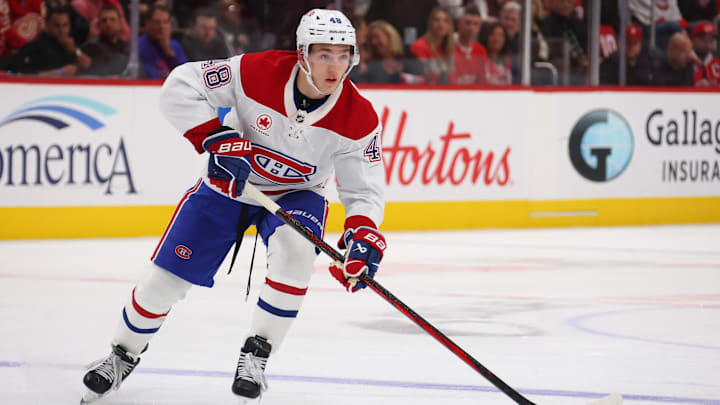The Montreal Canadiens signed Lane Hutson to a mind-shockingly low contract extension on Monday. The Habs locked up Hutson on an eight-year deal worth $8.85 million per season.
That’s actually below what other young blueliners like Jackson LaCombe and Luke Hughes got from their respective teams. The talk was that Hutson could fetch above $10 million AAV, but that was not the case.
In part, as Marco D’Amico discussed in an RG Media post from October 3, the Canadiens offered various creative ways of structuring Hutson’s contract to get around the heavy tax burden in Canada.
Be that as it may, the overall cap hit on Hutson’s contract has slammed the brakes on an arms race that promised to take young blueliner contracts to the moon. Several pundits proclaimed that Hutson could get over $10 million per season on his extension.
But the reality has completely taken the wind out of those sails. In fact, Hutson’s extension has had an effect similar to the one Connor McDavid’s deal had on the UFA forward market.
Had Hutson taken the Habs to the cleaners, other young defensemen coming up could have used his deal as a comparable. That won’t be the case now. And because of Hutson, other clubs can wield leverage over their up-and-coming blueliners.
Think about Thomas Harley in Dallas, Simon Edvinsson in Detroit, Philip Broberg in St. Louis, or Brandt Clarke in Los Angeles. These future RFAs won’t have the leverage to say, “Hey, Hutson got $10 million, so I can come in around $7 million or $8 million.”
Future contracts for pending RFA defensemen will come in much lower than anticipated. All because Hutson and the Canadiens worked out a deal favorable for both sides.
Hutson had little to no leverage with Canadiens
Lane Hutson didn’t have much leverage in his negotiations with the Montreal Canadiens. He was a 10.2(c) RFA, meaning he’s ineligible for arbitration or an offer sheet. That situation meant that Hutson could not use those two common weapons to twist the Canadiens’ arm.
So, the only way around the potential contract stalemate was to reach an agreement or not play at all. Of course, sitting out an undetermined amount of time over a contract squabble would not help either side. Neither Hutson nor the Canadiens would have benefited from such a situation.
That’s why a deal got done when it did. Perhaps Hutson left some money on the table. But as explained earlier, the Canadiens likely worked out a creative way of getting Hutson paid, without taxes gobbling up the bulk of his paycheck.
At the end of the day, Hutson got paid, the Canadiens got a team-friendly cap hit, and the broader RFA market will see a flatline. It will be shocking to see a blueliner like Thomas Harley surpass Hutson, LaCombe, or Hughes.
Kudos to the Canadiens for making one of the savviest business decisions in a long time.
